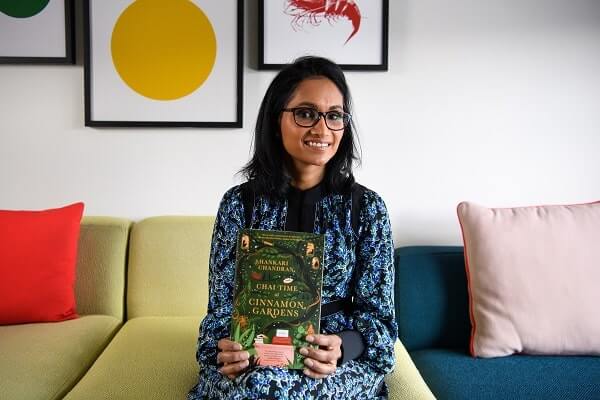The announcement of Shankari Chandran as winner of the Miles Franklin Literary Award 2023 for her book Chai Time at Cinnamon Gardens has rightly made her talk of the town. I had my own fangirl moment a few days ago, being able to have a heartfelt chat with her about this win, the journey she’s been on, representation in the arts, and a whole bunch of things in between.
If it hadn’t been clear thus far, it should be clear now. Shankari is an impeccable writer, and her words leave readers not just entertained and informed, but provoked, and particularly for a South Asian migrant in Australia, heard. It almost feels magical the way she can beautifully convey those emotions I have felt but haven’t been able to translate into thought yet.
“When you’re not white Australian, you’re often challenging and navigating your place in Australia,” Shankari recounted to me. “To receive the Miles Franklin Literary Award, given the content of the novel, is so incredibly rewarding.”
How Chai Time at Cinnamon Gardens came about
“I genuinely wanted to share a story that I finally felt brave enough to express, under the firm belief it would never be accepted,” Shankari was candid about her award-winning work. “At the time (of my first novel) Australian publishers said it wasn’t Australian enough, that they wouldn’t be able to sell it in the Australian market. It just felt like a repudiation of my place in Australia.”
I think herein lay her power, because when you write with no audience in mind, off come the filters, and you’re left with the breathing space to fully exhale. We spoke of how this award is deeply validating for Shankari given her long journey of (perceived) rejection, but in one way, the lack of immediate acceptance is what has allowed Shankari to truly represent herself, and the rest of us, in such a raw and unadulterated way. We need to have these conversations about race and our place in Australian culture, and Chai Time removes the social niceties and etiquette that has often meant we end up skirting around the core issues.
“This is our culture, and it’s different from white culture, but it’s just as Australian as any other culture,” Shankari stressed. “Because that is what Australian culture is. It’s a multiplicity of cultures and identities, and all of them are valid and all of them are valuable.”
Representation
Shankari Chandran’s Chai Time win speaks volumes to the increasing significance of the non-Anglo voice in the arts. We need to ensure this trajectory continues in a way that is genuine and authentic, being careful to steer away from tokenistic expressions, as is sometimes seen in political and corporate spheres. People of colour, both as creators and participants, need to be empowered to tell and drive their own stories.
Hopefully, sooner rather than later, they need to play a role in promulgating and funding these stories and creating new spaces so that we are not just relegated to being coloured specks on the same white canvas.
“The South Asian community across the world also has power and money and education and damn good stories to tell, so we should be funding our own stories,” Shankari noted. “We don’t have to go to white power, we can go to brown power, and brown power should be stepping in.”
After Chai Time
Unsurprisingly, there is already a lot simmering in the background for Shankari – she is hoping to eventually turn Chai Time into a TV adaptation, similar to her previous novel Song of the Sun God (which for those who didn’t know, will feature a much-loved Bridgerton star). She also has another novel in the works, to be released in April 2024, which will also feature a character who has lived through some part of the civil war. “Choosing to write (or not write) about the war is not something I feel we have a choice about, it’s a cultural driver and cultural responsibility…. white writers never get asked if they’re only going to write about white Australians.”
This is what I admire about Shankari the most – she reminds us that the experience of war, relocation, recreation of identity and its associated trauma is not a homogenous experience, and that its effects are reverberating and lasting. A story is not finished because it is told once, by one person and in one form.
If there is anything to take away from this read it should be Shankari’s powerful counsel to all emerging South Asian writers and artists. “Keep going, keep writing,” Shankari urged. “We need to be the new normal. I want South Asian creators to be more, do more, be more successful.”
We are potentially on the precipice of new shifts in how the arts is explored and received, and I truly believe South Asian voices are being weaved into the fabric of these new foundations. We have an opportunity to express our ideas outside of Western paradigms and expectations, and Shankari has helped to pave a path for us to do that. It is now up to us to walk alongside her on it.
READ ALSO: Sri Lankan Stories at the Sydney Writers’ Festival






